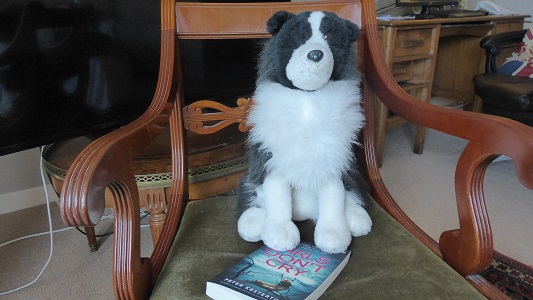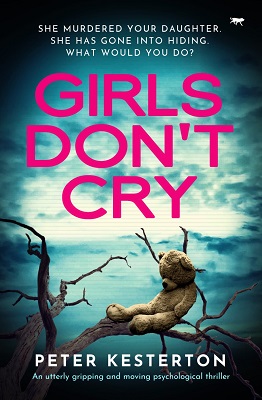Peter Kesterton
I am thrilled to have interviewed author Peter Kesterton, who shared with us details of his writing life, his book ‘Girls Don’t Cry‘, which was released on 23rd February 2023, and answered a few fun questions. This post contains affiliate links.

Peter was born in Manchester to Irish parents who gifted him the tradition of storytelling and a love of words. Unusually for an Irish family he was an only child and found company in books and stories. He moved to Bristol to go to university and loved the city so much he stayed on after graduating. He landed a job as a technician at the BBC and worked on radio dramas. Not content with simply doing the sound effects, he decided to write his own radio play. Many years and drawers full of rejections later, his radio drama Heads You Win, Tales I Lose, was broadcast on BBC Radio 4.
Peter went on to write stage plays, notably Air Guitar for the Bristol Old Vic Theatre and Playing with Snails which won the Croydon Warehouse International Playwriting competition 2011.
In 2019, Peter attended Bath Spa University as a mature student, undertaking an MA in creative writing. He graduated with distinction. Girls Don’t Cry, his debut novel, was partially written on the course.
1) Where did the inspiration for your book come from?
I used to be a playwright and the book started life as a play, which I later wrote up as a book. But the original idea grew out of a writing exercise I did on a scriptwriting course years ago.
Called A Sense of Place, it involved finding a physical place in the real world and going there to contemplate with an open mind until a story began to form in one’s head. I chose the ruin of an old church in Bristol. It had been destroyed in World War 2. I imagined the pilot of the plane that dropped the bomb which destroyed the church, visiting the ruin and seeing the destruction he’d caused for himself. He comes across a mother who’d lost a child in the bombing and I imagined the encounter between them. This quickly morphed into wondering
what I would do if confronted with the killer of my own child. A terrible and painful thought that I naturally wanted to run away from. But nevertheless I began to wonder what I would do. And so the story was born.
As I mentioned, I wrote it as a stage play which won an award and was subsequently put on at the wonderful but sadly now defunct Bike Shed Theatre in Exeter. It was a great critical success, but I always thought it deserved a wider audience. Years later while undertaking a MA in creative prose at Bath Spa University I gained the confidence to finally develop the play into the book I thought it deserved to become.
2) How did you plan out the plot?
The book is far more complex than the original play, but I knew that the key scene in the book would be the play’s climax. So when I started writing I knew what the direction of travel was. I didn’t plan out the whole thing though. The way I work is to plan ahead a few
chapters at a time. Write a very rough draft, improvising as I go. Once that’s done I go back and do a proper first draft with much more detail in it. I’m just not one of those people who can plan everything that happens in a novel before I actually write it. I don’t have that kind of brain. And when I try to do that, I find it so technical and lacking in emotion, I lose interest.
My writing method is to write straight to the computer, I don’t know what I’m going to write until I’m actually writing it, so I guess you could say I ‘think’ on the screen.
3) When did you choose the title for your book?
The book originally had another title, but Bloodhound Books, my publishers wanted something more suggestive of a psychological thriller. There was quite a bit of constructive discussion about various titles, and eventually I suggested Girls Don’t Cry, which Bloodhound were happy with. I think Girls Don’t Cry is a much stronger title than my original idea, so I’m more than happy.
4) How did you come up with the names for your characters?
I always had the idea of the female protagonist coming from an Irish family, as I do, and the name Caitlin just popped into my head. I later discovered it’s derived from the Greek word katharos, meaning clear, clean, and pure, which I thought was an ironic comment on Caitlin herself, who is anything but that, at least in the eyes of the world. Darren was based, (at least partially) on a guy who once did some building work on my house years ago. The name and general demeaner of the builder just seem to fit the character I had in mind for the male protagonist in my book.
5) Can you give us a hint to any sections that you removed?
The one place where I did cut out compete sections was in the first few chapters. Partially because the book was originally a bit long, and partially because by beta readers said the moment when Darren goes to Boggart Hill, where Riley his daughter was murdered, was so strong, that it was the place to start the book.
Originally Darren was driving around Bristol and there was quite a bit of backstory before the Boggart Hill scene. Other than that I didn’t remove whole sections. However some chapters did get a severe pruning, where I’d got a bit whimsical and poetic, instead of getting on with the plot.
6) What made you choose this genre?
The genre chose me! I thought of the idea and it naturally comes under the heading of Psychological Thriller. The ideas I come up with do seem to fall into this category. I’m always interest in a why done it, rather than a who dunnit, and love exploring the grey areas between what is right and wrong. I don’t see things in black and white, so could never write a standard police procedural for instance, which is more about evidence and clues than psychology. I think in the end, psychology is everything!
7) How long did it take you to complete your book?
It had a very long gestation period and as I mentioned was a play to begin with, so the answer is over ten years. But the book itself was mostly written while on my Master’s at Bath Spa so took about a year to write and another six months or so to re-edit following feedback. Then of course there’s the long process of approaching agents and publishers, so add another six months or so for that. After it was picked up by Bloodhound Books, things moved fairly quickly. As a digital only imprint, they move a lot faster than traditional publishers, so it took another six months for copyediting, do the cover design and so on.
8) Can you describe your book in three words?
EMOTIONAL ROLLER COASTER Is that two or three words?
9) What’s the hardest part of being a writer?
Working on your own and not knowing if anyone will ever read your work, let alone actually like it.
10) Why should our readers pick your book up?
It’s an emotionally gripping story, described as unputdownable by quite a few reviewers. It will make you think and question your ideas about evil, guilt and forgiveness. You’ll wonder just what you would do if, heaven forbid, you faced the same situation as Darren.
Publisher – Bloodhound Books
Pages – 376
Release Date – 23rd February 2023
ISBN 13 – 978-1504083294
Format – ebook, paperback
Synopsis
A decade after his young daughter’s murder, a grief-stricken father’s need for justice puts his own life in danger as events spiral out of control . . .
Ever since Caitlin Grady was released from prison, Darren has been tormented by rage and injustice. He finds himself venting online, where a stranger befriends him—and encourages him to seek revenge.
But Caitlin no longer goes by that name. She has been given a new identity and is living quietly, dreading exposure as the tabloids—with help from her publicity-hungry mother—try to hunt her down. And having committed the crime at age eleven, Caitlin struggles as an adult on her own, out in the world beyond prison walls.
Will Darren manage to track Caitlin down, and if he does, will he be able to carry out his plans?
Purchase Online From:
Fun Questions

1) Do you have a writing buddy (i.e. a pet)?
Not exactly. We have a novelty dog doorstop in our house with wonky eyes, which sits near me and keeps me company. His name is Pirate and I have occasionally been known to speak to ask him advice…

2) Do you have any writing quirks?
I don’t know if it’s a quirk but I do like to listen to music when I’m writing. It has to be something without any lyrics, and I find film score music is very motivational. Hans Zimmer is a favourite. Mornings are my best time, I try and write before I do anything else, apart from down a couple of coffees to get me going.
3) Where do you write?
We live in a flat and space is limited, so I have a desk in the main kitchen-living area. I do like writing in the main room, rather than being tucked away somewhere as it feels more sociable. Also we have great views across Bristol City Harbour which is good for staring out at for hours when I can’t think what to write. A room with a view is a wonderful thing for a writer to have.

4) Your book has been made into a movie, you’ve been offered a cameo role, what will you be doing?
I’d love to play the long-suffering George, Caitlin Grady’s probation officer. But that role is a secondary character rather than a cameo, so I might do the creepy guy who hangs out in the café where she works. Although I wouldn’t like to get type cast as ‘the creepy guy!’
5) A talking owl has just finished reading your book, what’s the first thing he says to you?
Woohoo. Your book contains some very wise words, even an old bird like me found plenty to hoot at. Can I suggest though that if you write me in to a future draft I can get rid of those pesky seagulls by pretending to be a hawk (I’m a master of disguise). Although I do admit that I am partial to fish and chips myself, so Caitlin might have to share her dinner with me. PS Can we lose the cat in chapter 42?
Author links
Goodreads
Website
A big thank you to Peter Kesterton for sharing his writing life with us and for a wonderful interview.
The post Interview with Author Peter Kesterton appeared first on Whispering Stories.



